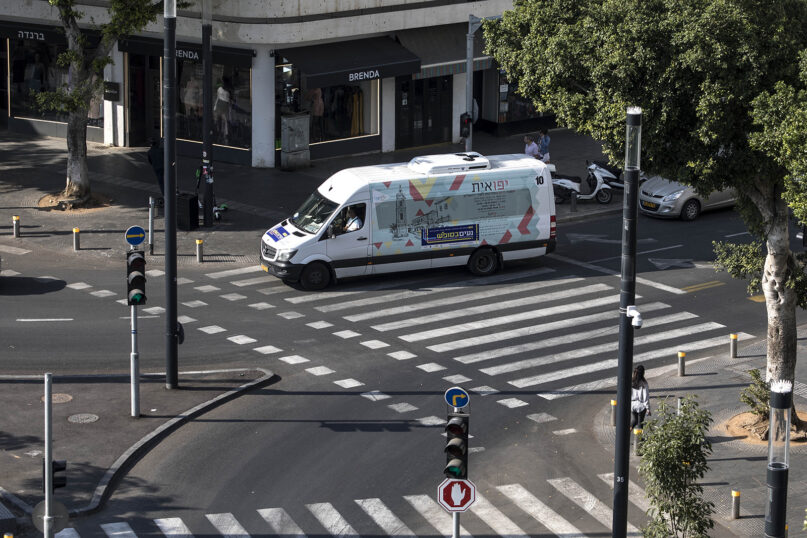(RNS) — It’s not unusual to read about the “monopoly” Israel’s Orthodox Jewish state rabbinate maintains on public life. The rabbinate sets standards for marriage, divorce and conversion, serving thereby as a regulatory body, roughly analogous to how the Food and Drug Administration in the United States regulates what can be sold legally and how we define nutritional terms.
No Israeli, however, is forced to abide by religious rules. Kosher restaurants abound in Israel, but the country’s Jews also have their pick of eateries where they can find dishes containing shrimp or ham, both forbidden by halacha, or Jewish law.
Even with regard to personal status issues, Israelis are broadly uninhibited by the rabbinate’s oversight: A recent survey showed that Israel is sixth in the world for marriages per capita. Israel also readily recognizes marriages in other countries; Jews who can’t abide by the rabbinate’s rules can and do get married in nearby locations — which is possibly a factor in making Cyprus, a short flight from Israel, the top country for marriages per person in the world.
There is an area of public life, however, that has pitted Orthodox and other tradition-minded Israelis against their secular neighbors: Sabbath laws forbid public transportation like buses and light rail from operating after sundown each Friday until after dark on Saturday night. Supermarkets, too, are not supposed to operate on Shabbat.
As in the case of marriage — where the “Cyprus loophole” avoids dealing with the rabbinate — when it comes to Shabbat transportation activities, Israelis determined to be unrestrained in their travel on the Sabbath have found ways to that end. There is no law against personal travel on Shabbat, so anyone with a car (or a friend with a car) can travel and shop and recreate as he wishes, seven days a week.
Various municipalities, including Tel Aviv, offer de facto Shabbat public transportation, in the form of free bus service (which isn’t legally constrained as pay-per-ride lines are).
According to a report by the Israel Democracy Institute, there are “immense gaps between the laws and regulations and the reality actually taking place on the ground in Israeli cities and towns.” The report found that 98% of movie theaters and 82% of museums operate on Shabbat, along with 26% of shopping malls. Those percentages show a marked increase over recent years.
The IDI also noted a decrease in enforcement of Shabbat laws on the books. In 2018, 360 files were opened for Shabbat law violations by businesses. In 2021, the number was just 89.
At least with regard to Shabbat laws, the “Jewish” part of Israel’s self definition as a “Jewish and Democratic State” seems to have yielded to the “Democratic” part.
Which was inevitable. Israel isn’t a theocracy, and in Israel, as in all democratic societies, personal freedom is a high ideal. For their part, the Orthodox parties in the Knesset, Israel’s parliament, focus mainly on the needs and aspirations of their constituents and have never tried to coerce all Israelis to become halacha observant. Despite government attempts to preserve some degree of respect for Shabbat in the public realm, the secular citizenry has won.
But they have lost.
Anyone visiting a religious neighborhood on the Jewish Sabbath — be it Brooklyn’s Borough Park, Jerusalem’s Meah She’arim or any other Orthodox Jewish enclave — cannot help but be struck by its ethereal calm.
There is a warmth and a peace that descends on such places as the sun sets. It is something that eludes words, that has to be felt in the flesh and in the spirit.
It’s not just the lack of traffic (with traffic lights futilely signaling to nobody) and not the quiet — on the contrary, there are many sounds to be heard, of Sabbath songs wafting through dining room windows, prayers coming from synagogues, Torah-study from study halls, children at play.
The shuttered stores are part of the gestalt of the day. Part of Shabbat is preparing beforehand for Shabbat, so that all of Saturday’s needs have already been purchased and prepared by Friday. The Sabbath day, when it arrives, is unburdened bliss.
Countless nonreligious visitors to Jerusalem’s religious neighborhoods have marveled at the special Shabbat atmosphere.
The famed liberal rabbi Abraham Joshua Heschel wrote a wonderful book called, simply, “The Sabbath.” In it he tries to capture in poetic prose some of the specialness that is Shabbat. “Six days a week,” he writes, “we wrestle with the world, wringing profit from the earth; on the Sabbath, we especially care for the seed of eternity planted in the soul.”
“The Sabbath” he pithily observed, “is the day on which we learn the art of surpassing civilization.”
And so, the secular populace of Israel, living as they do in a free country, have won the Shabbat battle and can catch a bus, attend a concert or visit a mall as they wish on the Jewish Sabbath.
But there’s something else, something priceless, that they’ve lost.
(Rabbi Avi Shafran writes widely in Jewish and general media and blogs at rabbiavishafran.com. He also serves as director of public affairs for Agudath Israel of America, a national Orthodox Jewish organization. The views expressed in this commentary do not necessarily reflect those of Religion News Service.)





